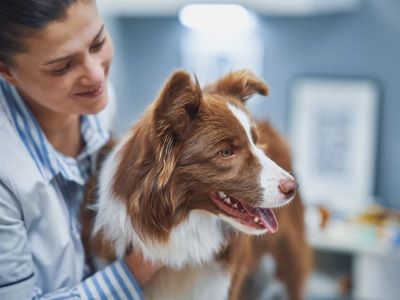In case someone has an unhealthy pet, it becomes a moment of anxiety. Understanding the way you should act and what is supposed to be done could mean that your dear animal will get better or worse. This manual provides what you can do when your dog is sick, right from basic first aid to seeking veterinary care for your dog.
We will also delve into how important home care, nutrition, and emotional support can make it easier for dogs to fully recover. Hence let’s figure this out together so that we are prepared in love and knowledge for such tough times.

What to Do When Your Dog Becomes Injured or Sick?
Here’s what to do when your dog becomes injured or sick:
Assessing the Situation
Panic is perfectly normal when you have a hurting pet. Nevertheless, being calm and acting quickly may save their life. At this decisive time, first of all look at what is happening sharply.
Take a deep breath and examine how well your dog looks look out for any obvious signs of distress such as heavy breathing, whining or injuries on the body.
First Aid Basics for Dog Owners
As a responsible owner of pets it’s very crucial to have some basic knowledge regarding first aid techniques for dogs. Start by examining your dog’s body to find any visible injury or sign pain. With bleeding apply gentle pressure on the wound using clean cloth or bandage until bleeding stops if possible (phrasing).
For breaks in bones and complicated wounds it would be advisable not to move him unnecessarily but call in immediately a veterinary doctor.
It’s also a good idea to have a portable dog washer handy for cleaning wounds or giving your dog a quick bath if needed.
When Should You Seek Veterinary Help?
It’s common knowledge that lots of minor cuts as well as scratches can be handled at home; however there are cases where expert veterinary help should be sought . There are even things that indicate you need to see the veterinarian urgently: excessive blood flow , difficulty in breathing , unconsciousness , very severe pain , etc . All these factors relate with his safety.

Veterinary Care
Here’s are the steps of the veterinary care:
What Are the Most Common Injuries and Illnesses in Dogs?
Educating yourself about common injuries and illnesses in dogs will enable you to recognize potential health problems and deal with them appropriately. Some of the most frequent injuries are lacerations, fractures, and sprains whereas common diseases may range from gastrointestinal disorders to respiratory infections and skin diseases.
Diagnostic Tests and Treatments
Once at a veterinary hospital, your pet could undergo various diagnostic tests like blood work, x-rays or ultrasounds; that can reveal what exactly is causing it. And basing on this diagnosis your vet will recommend appropriate treatment options such as giving drugs or performing surgery among others.
Why Follow-Up Visits Matter
Aftercare is very important for complete healing of your dog. The veterinarian is likely to create an arrangement for follow up visits so as to examine your animal’s situation and make sure that it’s on track eventually. These appointments must be attended with caution following the instructions strictly.
Taking Care of Your Dog At Home
Here’s how you can take care of your dog at home:
Preparing a Comfortable Healing Area
After a dog has received veterinary treatment, it may need to be taken care of even at home. A healing space that is comfortable and sage should be created for the sake of their lives. The area should thus be quiet with a soft bed, pillows and blankets and water as well as food dishes within reach.
Medication Management
In case your vet gives you some drugs for the dog, then it becomes important to give them in the right way and dosage. Make yourself reminders or use pill pockets so that you don’t forget giving medicine to your pet at the right time. Don’t adjust or stop using medications without consulting with your veterinarian.
Monitoring Your Dog’s Progress
Observe your dog’s behavior during recovery period. Look out for signs of discomfort, lethargy or any changes in physical appearance or behavior. Provide veterinarian with detailed notes so that they can make better analysis on progress of your pet during subsequent visits.
Adjusting Your Dog’s Diet During Recovery
Feeding your dog correctly is very important in its recovery process. Depending on their condition, your veterinarian might recommend a specialized prescription diet or supplementation among other dietary adjustments. Follow these instructions correctly since specific nutrients will help heal him/her besides promoting his/her general health.
Ensuring Proper Hydration
Remember that enough amount of water is inevitable during recovery as it promotes different functions of the body and heals too. Ensure therefore that clean fresh drinking water is always there for them while carefully observing how much they drink on daily basis. When dogs are reluctant to drink water or dehydrated your vet will assist you accordingly.
Physical Therapy and Rehabilitation
Here’s how physical therapy and rehabilitation helps the dog:
Exercises for Recovery
Sometimes, the vet may prescribe some exercises which also act as rehabilitation measures on an individual patient’s situation. Such exercises can strengthen muscles enhancing mobility while preventing future injuries and complications from arising by any means necessary. Therefore, exercise routine includes following physician’s order closely while waiting for change which sometimes happens but slowly.

Alternative Therapies
Apart from conventional veterinary care, there are other alternative therapies that pet owners may try on their pets such as acupuncture, hydrotherapy and massage. These options can be combined with more traditional modes of treatment in order to manage pain and help muscles relax as well as improve overall wellbeing.
Prior to embarking on any non-traditional remedies, speak with your vet first to ensure they are suitable for the canine.
The Role of Comfort and Companionship
Stress, anxiety or even depression could affect a dog during the healing process. As much as physical care is concerned, emotional support can also be crucial. Thus, let the pet owner spend some quality time with a dog by gentle patting accompanied by comforting words or yummy treats or toys. The bonding between the two of you will therefore lift his spirits apart from helping him recover properly.
Recognizing Signs of Stress or Depression
Observe them closely in case these behaviours change that indicates stress such as eating less, oversleeping and avoiding contact with others; if observed then consult your veterinarian since there are interventions or extra support they might suggest to handle this part of their emotions.
Preventing Common Injuries
Though unintentional events may occur thus leading to an accident but common injuries should be avoided through possible proactive actions that would save your dog suffering. Ensure that your home premises and compounds outside are childproofed without leaving potential risks unattended to hence secure all hazards within reach.
Allow plenty opportunities for safe playtime and exercises even going ahead to include dog obedience training so it reinforces good behaviours.
Creating a dog first aid kit
Any owner of a pet should have enough supplies for treating wounds that can be used in case of emergency. These supplies may consist of gauze, bandages, antiseptic solutions, tweezers and other items that your veterinarian recommends. Study the contents of the kit and how each item is used to enable you to give simple first aid during emergencies.
Emergency Planning for Pet Owners
Apart from just the First-Aid Kit, it is also critical to develop an emergency plan for your hound. Keep contact details for your vet, nearest emergency clinic and pet hotline close by. Know the fastest way to get to an animal hospital and ensure that there’s a means by which you can reach there fast.
By taking these steps and being proactive about your dog’s health, you will be better prepared to handle emergencies and help them recover with confidence and sensitivity.
Conclusion
During our journey as pet owners we must face situations where our sick or injured dogs need us most. Nonetheless, if well equipped with knowledge and preparedness one can manage these challenges successfully with empathy. Remember quick action love filled care is all he needs in his healing journey. As we wrap up this guide, we hope that you feel ready to handle such cases better than before so that your adorable companion makes quick recovery. For truly, a happy dog means a healthy home



